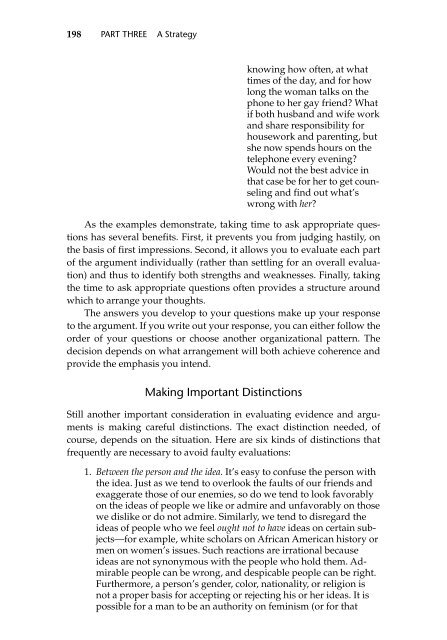Beyond Feelings
Beyond Feelings
Beyond Feelings
Create successful ePaper yourself
Turn your PDF publications into a flip-book with our unique Google optimized e-Paper software.
198 PART THREE A Strategy<br />
As the examples demonstrate, taking time to ask appropriate questions<br />
has several benefits. First, it prevents you from judging hastily, on<br />
the basis of first impressions. Second, it allows you to evaluate each part<br />
of the argument individually (rather than settling for an overall evaluation)<br />
and thus to identify both strengths and weaknesses. Finally, taking<br />
the time to ask appropriate questions often provides a structure around<br />
which to arrange your thoughts.<br />
The answers you develop to your questions make up your response<br />
to the argument. If you write out your response, you can either follow the<br />
order of your questions or choose another organizational pattern. The<br />
decision depends on what arrangement will both achieve coherence and<br />
provide the emphasis you intend.<br />
Making Important Distinctions<br />
knowing how often, at what<br />
times of the day, and for how<br />
long the woman talks on the<br />
phone to her gay friend? What<br />
if both husband and wife work<br />
and share responsibility for<br />
housework and parenting, but<br />
she now spends hours on the<br />
telephone every evening?<br />
Would not the best advice in<br />
that case be for her to get counseling<br />
and find out what’s<br />
wrong with her?<br />
Still another important consideration in evaluating evidence and arguments<br />
is making careful distinctions. The exact distinction needed, of<br />
course, depends on the situation. Here are six kinds of distinctions that<br />
frequently are necessary to avoid faulty evaluations:<br />
1. Between the person and the idea. It’s easy to confuse the person with<br />
the idea. Just as we tend to overlook the faults of our friends and<br />
exaggerate those of our enemies, so do we tend to look favorably<br />
on the ideas of people we like or admire and unfavorably on those<br />
we dislike or do not admire. Similarly, we tend to disregard the<br />
ideas of people who we feel ought not to have ideas on certain subjects—for<br />
example, white scholars on African American history or<br />
men on women’s issues. Such reactions are irrational because<br />
ideas are not synonymous with the people who hold them. Admirable<br />
people can be wrong, and despicable people can be right.<br />
Furthermore, a person’s gender, color, nationality, or religion is<br />
not a proper basis for accepting or rejecting his or her ideas. It is<br />
possible for a man to be an authority on feminism (or for that


